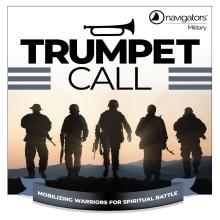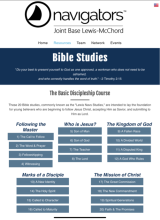Knowing and Living The Scriptures
By Dan Daetz, NavsMilitary — Imagine sending someone into battle who didn’t know how to use their weapon correctly. As those around them are coming under fire, they are fumbling around with their ammunition, figuring out how to maintain a good grip, aiming wildly with no sight references, and even struggling to distinguish between hostile targets and friendly forces. There is a high likelihood that they—or those around them—will become a casualty.
The Bible teaches us that we are on a spiritual battlefield. Our battle is not against people (Ephesians 6:12), but against a supremely evil, deceptive, and determined adversary: “Your enemy the devil prowls around like a roaring lion…” (1 Peter 5:8). In this ongoing battle, “the weapons we fight with are not the weapons of the world” (2 Corinthians 10:4). Our ultimate weapon, the only one that can land blows against the devil, is “the sword of the Spirit, which is the Word of God” (Ephesians 6:17). Jesus demonstrated the value of this weapon when He was tempted by Satan in the desert.
Three times, the devil presented an appealing temptation to Jesus. Three times, the Son of God appealed to the Word of God. “It is written…” (Matthew 4:4,7,10). Our perfect Savior did not appeal to his own authority or human willpower. He drove Satan away by standing firm on the promises of Scripture. Jesus was prepared to prevail under pressure by His understanding of the Word. He knew what it said, but His focus was not on mere recitation (Jesus didn’t even quote “chapter and verse”—a much later invention). His focus was on deep understanding within the broad story of Scripture. This enabled Him to apply the Word—to handle this powerful weapon—with skill and effectiveness.
How is your “weapon training” going? There are many ways to “get a grip” on the Word. Five methods are discussed in The Navigator illustration of the Word Hand™ (available at this link): hearing the Word taught, reading the Bible (for the big picture), studying it (for depth of understanding), memorizing key passages (for immediate recall), and meditating on its meaning (for application to your life). All of these methods are valuable. However, there is a fundamental element that we can’t overlook. If we miss it, this weapon will just be dead weight in our hands. We have to trust the weapon’s Maker. In other words, if we don’t believe the Bible is the Word of God—for example, if we think it is a “good book” of interesting stories, man’s wisdom, or feel-good messages—then it won’t have its intended effect on our lives.
This is not to say that exposure to the Bible isn’t a pathway to faith. “The Word of God is living and active” (Hebrews 4:12). Often the Holy Spirit opens unbelievers’ eyes to the truth in the midst of reading or hearing the Word. However, it is possible to repent and believe in Christ while finding reasons to mistrust Scripture. Even believers come up with excuses not to trust God’s Word. “It doesn’t fit our modern society.” “It disagrees with science.” “It’s too hard to understand.” “People wrote it, so it’s flawed.” Space does not allow for a discussion of these objections here. Often, though, we can use these arguments as a smokescreen for the real issue we have with Scripture: “I don’t like what the Bible says about….” If we set ourselves up as judges of Scripture, we will miss the opportunity to be transformed by it. However, if we choose instead to trust the divine Author, submitting our finite minds to His loving authority, we will grow in understanding. “With humility, comes wisdom” (Proverbs 11:2). By sharing our questions, insights, and application points within a fellowship of believers—those earnestly seeking God’s truth and trusting Him together—our preparation for spiritual battle will accelerate.
So handle the trustworthy weapon God has provided with increasing skill and care. Spend time alone in the Word. In community, explore its depths and learn its application to life. This isn’t just life-saving training, as we face off against a determined spiritual foe. Handling God’s Word well also equips us to give life to others. Jesus, the Word made flesh, comes alive for the lost not only in the pages of Scripture, but also as the Word transforms us into His likeness. Now that’s a target worth aiming for!
The Bible teaches us that we are on a spiritual battlefield. Our battle is not against people (Ephesians 6:12), but against a supremely evil, deceptive, and determined adversary: “Your enemy the devil prowls around like a roaring lion…” (1 Peter 5:8). In this ongoing battle, “the weapons we fight with are not the weapons of the world” (2 Corinthians 10:4). Our ultimate weapon, the only one that can land blows against the devil, is “the sword of the Spirit, which is the Word of God” (Ephesians 6:17). Jesus demonstrated the value of this weapon when He was tempted by Satan in the desert.
Three times, the devil presented an appealing temptation to Jesus. Three times, the Son of God appealed to the Word of God. “It is written…” (Matthew 4:4,7,10). Our perfect Savior did not appeal to his own authority or human willpower. He drove Satan away by standing firm on the promises of Scripture. Jesus was prepared to prevail under pressure by His understanding of the Word. He knew what it said, but His focus was not on mere recitation (Jesus didn’t even quote “chapter and verse”—a much later invention). His focus was on deep understanding within the broad story of Scripture. This enabled Him to apply the Word—to handle this powerful weapon—with skill and effectiveness.
How is your “weapon training” going? There are many ways to “get a grip” on the Word. Five methods are discussed in The Navigator illustration of the Word Hand™ (available at this link): hearing the Word taught, reading the Bible (for the big picture), studying it (for depth of understanding), memorizing key passages (for immediate recall), and meditating on its meaning (for application to your life). All of these methods are valuable. However, there is a fundamental element that we can’t overlook. If we miss it, this weapon will just be dead weight in our hands. We have to trust the weapon’s Maker. In other words, if we don’t believe the Bible is the Word of God—for example, if we think it is a “good book” of interesting stories, man’s wisdom, or feel-good messages—then it won’t have its intended effect on our lives.
This is not to say that exposure to the Bible isn’t a pathway to faith. “The Word of God is living and active” (Hebrews 4:12). Often the Holy Spirit opens unbelievers’ eyes to the truth in the midst of reading or hearing the Word. However, it is possible to repent and believe in Christ while finding reasons to mistrust Scripture. Even believers come up with excuses not to trust God’s Word. “It doesn’t fit our modern society.” “It disagrees with science.” “It’s too hard to understand.” “People wrote it, so it’s flawed.” Space does not allow for a discussion of these objections here. Often, though, we can use these arguments as a smokescreen for the real issue we have with Scripture: “I don’t like what the Bible says about….” If we set ourselves up as judges of Scripture, we will miss the opportunity to be transformed by it. However, if we choose instead to trust the divine Author, submitting our finite minds to His loving authority, we will grow in understanding. “With humility, comes wisdom” (Proverbs 11:2). By sharing our questions, insights, and application points within a fellowship of believers—those earnestly seeking God’s truth and trusting Him together—our preparation for spiritual battle will accelerate.
So handle the trustworthy weapon God has provided with increasing skill and care. Spend time alone in the Word. In community, explore its depths and learn its application to life. This isn’t just life-saving training, as we face off against a determined spiritual foe. Handling God’s Word well also equips us to give life to others. Jesus, the Word made flesh, comes alive for the lost not only in the pages of Scripture, but also as the Word transforms us into His likeness. Now that’s a target worth aiming for!
More Resources
Website
A good study Bible
A good Concordance matching your study Bible
Apps can be used, but a hardcopy Bible is essential
The Navigators Bible Study Handbook
Audio Video
Two podcasts - Ron Mahler talks about gaining a lifelong handle and love for the Scriptures. Phil Partin tells his story of how he went from being a Christian to a person who knows and lives the Scriptures.
Bible Study
Check out the 20 Bible studies Military Navigators at Joint Base Lewis-McChord created as part of their Basic Di
For reference, here is the “official” Navigators Wheel Illustration webpage
Book
Recommended reading:
- InterVarsity Press “My Heart Christ’s Home”
- NavPress “The Discipline of Grace”







